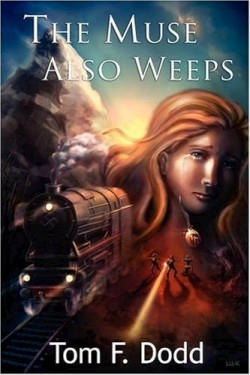The Muse Also Weeps
A sustainable suspense novel must keep the reader guessing throughout never knowing more than the accompanying characters. The premise of Dodd’s novel is certainly suspenseful: an esteemed art critic is unwittingly drawn into a broad conspiracy surrounding the murder of an ex-Nazi officer and a secret hoard of art treasure; but the prologue unfortunately gives most of it away. The reader must wait out the characters’ understanding of what the narrator has already revealed a regrettable dampening of what could have been an intriguing start to the story. Had Dodd left off the prologue no clarity would have been lost but a momentous amount of “page-turning” energy would have been gained.
Though the story eventually picks up pace incorporating events and characters new to the reader further problems at the beginning may prevent even avid suspense readers from continuing on. One is Dodd’s affection for strings of adjectives which though an admirable attempt to visually paint a scene actually delays conceptualization. In the first paragraph the reader is inundated with overused commas and adjectives including “the piercing squealing sounds of brake shoes” and “enormous churning steel drive wheels” and engine as giving “the impression of a great living fire-breathing monster.” (6)
But perhaps the biggest roadblock to the book’s success is poor editing. There are no indentions for paragraphs making it difficult to discern when one ends and another begins. This is particularly problematic with dialogue for it doesn’t appear separate from the text and two different speakers often appear on the same line making the reader do the author’s work to determine who is speaking when and to whom.
Still the book’s crafting of European settings and inherent drama of the Nazi era are effective and Dodd a retired health care executive from the Bronx appears knowledgeable about a variety of subjects even if at times the characters’ accomplishments are a bit surprising. For instance the critic Germain lectures confidently on the art world’s Lost Masterpieces boasts fluency in seven languages and is even “an accomplished classical guitarist.” (15)
Addressing the points of view of Nazi officers as Dodd does here is also tricky and Dodd swings ably between disparaging their misdeeds such as when the Third Reich’s looting is described as “justified under some twisted notion of repayment of war reparations” (7) and recognizing their human qualities. The Nazi General Baumann for example is described compassionately as having an “innate sense about creating order out of disorder” and a sense of care for the “dejected masses of men beginning their long individual journeys toward a very uncertain future.”(9)
It’s not clear if this perspective is Baumann’s or the narrator’s but Dodd delicately treads the line of not glorifying the Nazis but not shying from the reality of escaped officers living arguably normal lives among the citizens of the world. In the end it is this kind of facility with subject matter if not delivery that makes the book an enjoyable exploration of the hidden possibilities of our history.
Reviewed by
Christine Thomas
Disclosure: This article is not an endorsement, but a review. The publisher of this book provided free copies of the book and paid a small fee to have their book reviewed by a professional reviewer. Foreword Reviews and Clarion Reviews make no guarantee that the publisher will receive a positive review. Foreword Magazine, Inc. is disclosing this in accordance with the Federal Trade Commission’s 16 CFR, Part 255.

